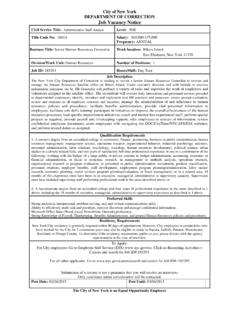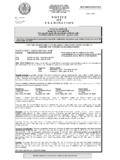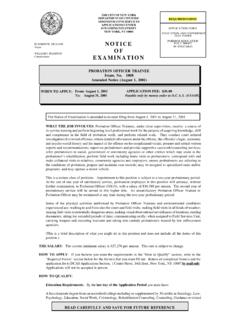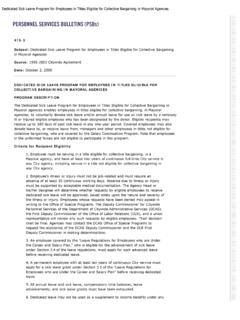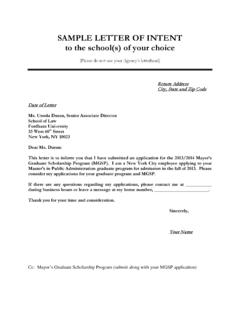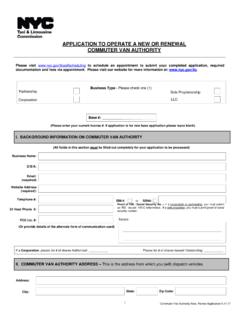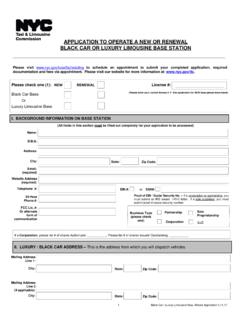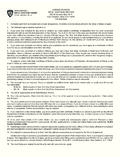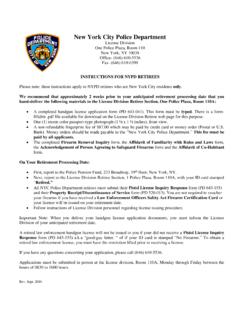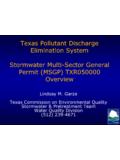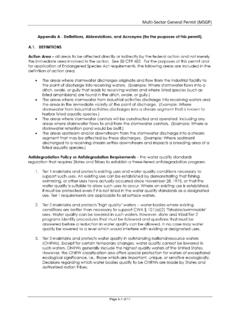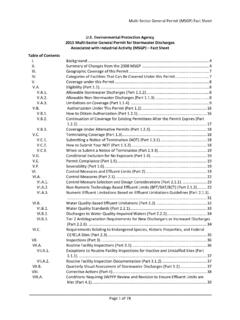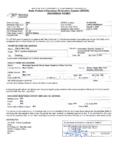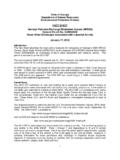Transcription of quick facts on NYC Municipal Separate Storm …
1 MS4 permit quick facts 1quick facts Municipal Separate Storm sewer system (MS4) PermitBackgroundThe Clean Water Act was passed by Congress in 1972 to protect and restore the health of the waters of the United States. The Act regulates certain types of stormwater discharges as well as wastewater discharges to waterbodies across the country. Since 1990, medium and large cities have been required to obtain a permit to discharge stormwater through Municipal Separate Storm sewer systems (MS4s). Since 1999, all urbanized areas have been required to obtain an MS4 permit . Since the 1990s, the New York State Department of Environmental Conservation (DEC) has imposed certain stormwater related requirements on the New York City Department of Environmental Protection s (DEP) MS4. Until August 2015, those requirements were incorporated into the State Pollution Discharge Elimination system (SPDES) permits for DEP s 14 individual wastewater treatment plants.
2 On August 1, 2015, DEC issued a new comprehensive MS4 permit for NYC. This permit includes robust requirements, which significantly expand the City s obligations to reduce pollutants discharging to the MS4. There are 14 NYC agencies with significant obligations under the MS4 permit . DEP is responsible for coordinating the interagency efforts to meet the City s MS4 is an MS4? Conveyance or system of conveyances; owned by a state, city, town, village, or other public entity that discharges to waters of the United States; designed or used to collect or convey stormwater; not a combined sewer ; and not part of a Publicly Owned Treatment Works (Wastewater Treatment Plant). To WastewaterTreatment PlantManholeManholeCatchBasinSeparate StormSewer SystemOutfallPipeRiverJanuary 2016(updated March 2016)MS4 permit quick facts 2 STORMWATER MANAGEMENT PROGRAM The MS4 permit requires the development of a Stormwater Management Program (SWMP) to reduce pollution reaching waterbodies through the MS4.
3 The SWMP plan is currently under development and will be submitted to DEC for approval by August 1, 2018. Key components of the SWMP include:PUBLIC EDUCATION, OUTREACH, INVOLVEMENT & PARTICIPATIONThe Education and Outreach program will focus on educating the public on water quality issues related to stormwater, and the steps people can take to reduce pollution and improve water quality. The Involvement and Participation program will seek, through public and stakeholder meetings, community and stakeholder input in the development, implementation, review and major revision of the program will create and maintain a detailed map that shows areas draining to the MS4, and locations of NYC owned and operated MS4 outfalls discharging to surface waters of the State. Preliminary estimates show that approximately 30 to 40 percent of NYC land area is covered by the MS4 permit .
4 ILLICIT DISCHARGE DETECTION & ELIMINATION (IDDE)The City will continue to implement its well-developed, existing IDDE program, while also exploring additional methods to prevent, detect, and eliminate illicit discharges to all City agencies Storm sewers. CONSTRUCTION SITE STORMWATER RUNOFF CONTROLThis program continues an existing State program that aims to reduce pollutants in stormwater runoff from construction activities. Construction activities involving land disturbance of one acre or more are required to implement erosion and sediment control measures as well as pollution prevention practices. The program, as implemented by the City under the MS4 permit , will include site inspection and enforcement actions. The City will also conduct a study to determine the appropriate reduction in the soil disturbance threshold at which projects must implement erosion and sediment control measures, and which management practices are acceptable.
5 POST-CONSTRUCTION STORMWATER MANAGEMENTThis program, also a continuation of an existing State program, is designed to reduce pollutants in stormwater runoff by requiring that new development and redevelopment projects incorporate stormwater controls in the final site plans and follow the New York State Stormwater Management Design Manual. Under this program, stormwater controls must be inspected and maintained by trained personnel. In addition, the City will conduct a study to determine the appropriate reduction in the soil disturbance threshold for triggering the applicability of post-construction stormwater management requirements at new development and redevelopment sites. This study will consider water quality improvements, compliance costs, local site conditions, numbers of affected public and private properties, types of development/zoning, total area managed, impervious coverage and other relevant permit quick facts 3 CONTROL of FLOATABLE & SETTLEABLE TRASH & DEBRISThis program targets floatable and settleable trash and debris that reach receiving waterbodies through the MS4.
6 By developing a methodology to estimate the extent of trash and debris, identifying best available control technologies, and evaluating existing programs, the City will seek to minimize the discharge of floatable and settleable materials from its Separate Storm sewer system . In the interim, the City will implement a Floatable and Settleable Trash and Debris Reduction Media Campaign that further educates the public on trash and debris control. The City s Media campaign, Trash Free NYC Waters, has been developed and is currently being & ASSESSMENT of CONTROLSThis program involves the expansion of existing programs to assess the effectiveness of the SWMP by evaluating long-term trends, detecting and eliminating illicit discharges, and characterizing and assessing the quality of discharges at representative MS4 outfalls. Under this program, the City will measure the success of the SWMP and assess compliance with the MS4 WATERS The MS4 permit includes additional provisions to address discharges to waters that the State has listed as impaired.
7 For stormwater discharges to impaired waters without assigned Total Maximum Daily Loads (TMDLs), the City will develop a program that ensures no net increase in pollutants of concern to impaired waters resulting from non-negligible changes in land use or stormwater management practices. In addition, the City will identify Priority MS4 Waterbodies where additional or customized BMPs may be warranted, including opportunities to implement green infrastructure pilot projects and other retrofits that are cost-effective and feasible. INDUSTRIAL & COMMERCIAL STORMWATER SOURCESThis program requires the City to prepare and maintain an inventory of industrial and commercial facilities that are possible sources of pollution to the MS4. In addition, the City will develop an inspection plan to assess whether unpermitted private industrial and commercial facilities require SPDES Multi-Sector General permit (MSGP) coverage.
8 The City will also conduct inspections and appropriate enforcement of covered MSGP facilities to ensure that appropriate BMPs are in place to prevent stormwater PREVENTION & GOOD HOUSEKEEPING for Municipal OPERATIONSThis program addresses Municipal operations and facilities that contribute or can possibly contribute pollutants to the MS4 and to the waters of the State in stormwater runoff. A complete inventory of facilities and operations will be compiled and maintained. Each facility will be required to implement best management practices (BMPs), policies, and procedures to reduce or prevent the discharge of pollutants. Facilities will conduct regular self-assessments to evaluate the effectiveness of the practices MANAGEMENT PROGRAM CONTINUEDMS4 permit quick facts 4 For more information:Scan the QR Code Visit 1, 2015 Effective Date of permit (EDP)SWMP Plan DevelopmentAug 1, 2018 Submit SWMP Plan to DECI nclude Fiscal Analysis Aug 1, 2020 permit RenewalImplementationAnnual ReportingAnnual Progress Reporting (1 & 2 years after EDP)* Calendar yearsPublic PresentationReport Submission Submit Legal AuthorityPublic PresentationReport SubmissionNote: Draft Annual Reports will be presented to the public by July 1 each year.
9 A summary of public comments and City responses will be included in the Final Annual Reports. Final Annual Reports will be submitted to DEC by September 30 of each year and made available to the PresentationReport SubmissionPublic PresentationReport SubmissionPublic PresentationReport SubmissionTIMELINE
